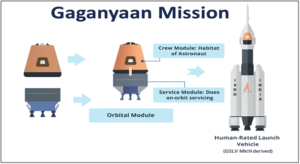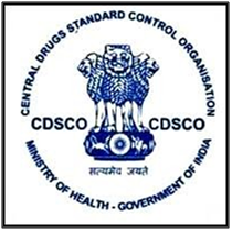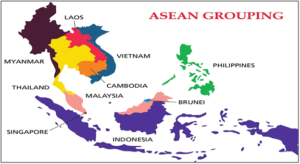Archives
(PRELIMS Focus)
Category: Science and Technology
Context:
- ISRO Chairman V. Narayanan on Thursday said that about 90% of the development work on the Gaganyaan mission had been completed.

About Gaganyaan Mission:
- Nature: It is India’s first human spaceflight program.
- Objective: It aims to send a crew of 3 astronauts to Low Earth Orbit (LEO) at 400 km for 3 days and return them safely to Earth.
- Importance: Gaganyaan success will place India among the elite group of nations (US, Russia, China) with human spaceflight capability.
- Phased mission: It includes unmanned test missions followed by the first manned mission expected to happen in early 2027.
- Astronauts selected: Group Captain Prasanth Balakrishnan Nair, Group Captain Ajit Krishnan, Group Captain Angad Pratap, and Wing Commander Shubhanshu Shukla are India’s astronauts-designated for Gaganyaan.
- Training: Astronaut Training Facility established in Bengaluru caters to Classroom training, Physical Fitness training, Simulator training and Flight suit training. Training modules cover Micro-gravity familiarization through Parabolic Flights, Aero-medical training, Recovery & Survival training, Crew Training Simulators, etc.
- Key Technologies for Crew Safety:
- Human-Rated Launch Vehicle (HLVM3): It is a modified version of ISRO’s LVM3 rocket. It includes solid, liquid, and cryogenic stages, re-configured to meet human rating requirements. It is capable of launching the Orbital Module to a Low Earth Orbit (400 km) and features a Crew Escape System (CES) with high burn rate solid motors to ensure crew safety during emergencies.
- Orbital Module (OM): It houses the Crew Module (CM) and Service Module (SM) with life support, avionics, and propulsion systems. The CM is a habitable space with an Earth-like environment, with a pressurized inner structure and unpressurized external structure. The SM supports the CM in orbit, providing thermal, propulsion, power systems, avionics, etc. but remains unpressurized.
- Preparatory tests for the mission:
- Integrated Air Drop Test (IADT): Validate parachute and deceleration systems.
- Test Vehicle Missions (TV): Test abort and launch systems.
- Pad Abort Test (PAT): Check crew module safety from various altitudes.
- Water Survival Test Facility (WSTF): Recovery trials with Navy support.
Source:
Category: Polity and Governance
Context:
- The Drugs Controller General of India (DCGI), which heads the Central Drugs Standard Control Organization (CDSCO) has directed digital monitoring for tracking the supply chain of high-risk solvents.

About Central Drugs Standard Control Organization (CDSCO):
- Nature: It is the National Regulatory Authority (NRA) of India for the medical devices industry under the provisions of the Drugs & Cosmetics Rules.
- Ministry: It works under the Ministry of Health & Family Welfare.
- Headed by: Drugs Controller General of India (DCGI) is the head of the CDSCO.
- Headquarters: Its headquarters is located in New Delhi.
- Major functions: Under the Drugs and Cosmetics Act, CDSCO is responsible for,
- Regulatory control over the import of drugs
- Approval of new drugs and clinical trials
- Approval of certain licences as Central Licence Approving Authority
- Coordination of the activities of State Drug Control Organizations.
About Drugs Controller General of India (DCGI):
- DCGI is the head of the department of the CDSCO of the Government of India.
- It is responsible for approval of licences of specified categories of drugs such as blood and blood products, IV fluids, vaccines and sera in India.
- DCGI also sets standards for the manufacturing, sales, import, and distribution of drugs in India.
Source:
Category: International Relations
Context:
- Prime Minister Narendra Modi will not travel to Malaysia for the ASEAN (Association of South East Asian Nations) leaders’ summit, but will attend the meeting virtually on October 26 instead.

About ASEAN (Association of South East Asian Nations):
- Nature: The Association of Southeast Asian Nations is a regional organization which was established to promote political and social stability amid rising tensions among the Asia-Pacific’s post-colonial states.
- Establishment: It was established on 8 August 1967 in Bangkok, Thailand, with the signing of the ASEAN Declaration (Bangkok Declaration) by the founding fathers of ASEAN: Indonesia, Malaysia, Philippines, Singapore and Thailand. 8th August is observed as ASEAN Day.
- Members: Its members are Brunei, Cambodia, Indonesia, Laos, Malaysia, Myanmar, the Philippines, Singapore, Thailand, and Vietnam.
- Motto: The motto of ASEAN is “One Vision, One Identity, One Community”.
- Secretariat: Its secretariat is located in Indonesia, Jakarta.
- Decision Making: The primary mode of decision-making in ASEAN is consultation and consensus.
- Fundamental principles: The ASEAN fundamental principles, as contained in the Treaty of Amity and Cooperation in Southeast Asia (TAC) of 1976 are:
- Mutual respect for the independence, sovereignty, equality, territorial integrity, and national identity of all nations.
- The right of every State to lead its national existence free from external interference, subversion or coercion.
- Non-interference in the internal affairs of one another.
- Settlement of differences or disputes by peaceful manner.
- Renunciation of the threat or use of force.
- Effective cooperation among themselves.
- Institutional mechanism:
- ASEAN Summit: It meets annually to discuss regional issues and set policy directions.
- ASEAN Coordinating Council (ACC): It oversees the implementation of ASEAN agreements and decisions.
- ASEAN Regional Forum (ARF): It is a platform for dialogue and cooperation on political and security issues among ASEAN member countries and their partners.
- Forums led by ASEAN:
- ASEAN Regional Forum (ARF): Launched in 1993, the twenty-seven-member multilateral grouping was developed to facilitate cooperation on political and security issues to contribute to regional confidence-building and preventive diplomacy.
- ASEAN Plus Three: The consultative group initiated in 1997 brings together ASEAN’s ten members, China, Japan, and South Korea.
- East Asia Summit (EAS): First held in 2005, the summit seeks to promote security and prosperity in the region and is usually attended by the heads of state from ASEAN, Australia, China, India, Japan, New Zealand, Russia, South Korea, and the United States. ASEAN plays a central role as the agenda-setter.
- ASEAN Defence Ministers Meeting (ADMM)-Plus Meeting: The ADMM-Plus is a platform for ASEAN and its eight Dialogue Partners to strengthen security and defence cooperation for peace, stability, and development in the region.
Source:
Category: International Relations
Context:
- In a welcome relief for millions of migrant workers, Saudi Arabia has officially ended the Kafala System, giving them more rights and freedom to work in the kingdom.

About Kafala System:
- Nature: The Kafala system is a sponsorship system used in several Gulf Cooperation Council (GCC) countries, including Saudi Arabia, Qatar, Kuwait, Bahrain, Oman, and the United Arab Emirates.
- Objective: It governs the legal status of migrant workers, particularly those from other countries in Asia and Africa, who come to work in these countries. It binds migrant workers to a specific employer, known as the “kafeel,” who is responsible for the worker’s visa and legal status.
- Drawback: Under the Kafala System, the employer, who is also the sponsor of the migrant workers, had an undue legal advantage over them as they were not allowed to switch jobs without the Kafala’s consent.
- Compared to slavery: Due to its exploitative nature, especially on migrant workers who come to the Middle East for jobs, including domestic work, construction, etc, critics have often called it modern-day slavery.
- Spotlight: The Kafala system had come under international spotlight ahead of the 2022 FIFA World Cup in Qatar, where thousands of migrant workers, mostly from South Asian countries including India died, during construction while working under excruciating circumstances.
- Features of the new contract system: It facilitates job mobility, allowing workers to transfer to new employment upon contract completion without requiring prior employer approval. It also grants workers the right to exit, return, and travel permanently by electronically notifying the employer, eliminating the need for employer consent.
- Kafala system in other countries: In 2009, Bahrain became the first country in the Middle East to abolish the Kafala system, while the UAE diluted its Kafala system in 2015, allowing migrant workers whose contracts have expired to obtain a new permit and remain in the country on a 6-month job seeker visa. GCC countries that still have the strict Kafala system in place are Kuwait, Qatar, and Oman.
Source:
Category: Government Schemes
Context:
- The Skilling for AI Readiness (SOAR) program has been launched by government of India, and it coincides with the 10-year milestone of the Skill India Mission, which has empowered people through various skilling schemes since 2015.

About Skilling for AI Readiness (SOAR) Programme:
- Launch: It was launched by the Ministry of Skill Development and Entrepreneurship (MSDE) in July 2025.
- Objective: It aims to integrate artificial intelligence learning into India’s school education and training ecosystem, preparing both students and teachers for a rapidly evolving digital world.
- Long-tern vision: SOAR’s long-term vision is to position India as a global leader in AI by preparing its youth for AI-driven careers and entrepreneurial ventures.
- In sync with NEP 2020: The National Education Policy (NEP) 2020 emphasises the inclusion of contemporary subjects like Artificial Intelligence (AI) in school curricula, at appropriate stages, to foster innovation and digital literacy among students.
- Focus: It focuses on school students from classes six to twelve and educators across India. It is offering three targeted 15-hour modules for students and a 45-hour module for teachers. These courses introduce foundational AI and machine learning concepts, along with data literacy and the ethical use of technology.
- Centre of Excellence in AI: In support of this vision, the Union Budget 2025–26 has earmarked ₹500 crore to establish a Centre of Excellence in Artificial Intelligence for Education. The centre will focus on developing AI-based learning tools, promoting multilingual AI resources for Indian languages, and fostering innovative classroom practices.
- Linkage with IITs: It will also strengthen AI curriculum development across technical institutions and complement existing efforts by IITs and AICTE-approved colleges that already offer advanced courses in machine learning, deep learning, and data analytics.
Source:
(MAINS Focus)
(GS Paper 3: Science and Technology – Developments and their Implications)
Context (Introduction)
The proliferation of AI-generated deepfakes and synthetic media has raised significant concerns regarding misinformation, electoral integrity, and personal rights. In response, the Indian government has proposed amendments to the IT Rules, 2021, mandating the labelling of AI-generated content to enhance transparency and accountability in the digital ecosystem.
Key Arguments:
- Widespread Proliferation: Advancements in generative AI have made it easier to create photorealistic images and videos, leading to the widespread dissemination of AI-generated content across social media platforms. For instance, Meta has initiated the labelling of AI-generated content on Facebook, Instagram, and Threads to inform users about the nature of the content they encounter .
- Democratic Risks: The rapid spread of AI-generated misinformation poses a threat to democratic processes. During India’s general election, over 75% of voters were exposed to political deepfakes, with nearly one in four believing the AI-generated content was real .
- Personal Rights Violations: Public figures have reported instances of their likenesses being misused in AI-generated media. For example, a deepfake video of Punjab Chief Minister Bhagwant Mann was created and circulated with the intent to defame him.
- Industry Initiatives: The Coalition for Content Provenance and Authenticity (C2PA) has developed an open technical standard, known as Content Credentials, to enable the verification of digital content’s origin and edits. This initiative aims to establish trust in media content by providing transparent information about its creation and modifications
- Regulatory Challenges: The current IT Rules, 2021, may not adequately address the complexities associated with AI-generated content. The proposed amendments seek to fill this regulatory gap by introducing clear guidelines for labelling AI-generated content, thereby enhancing user awareness and trust .
Criticisms / Drawbacks:
- Enforcement Complexity: Ensuring consistent identification and labelling of AI-generated content across diverse platforms and formats presents significant enforcement challenges.
- Legal Ambiguities: The introduction of subordinate legislation without thorough parliamentary scrutiny may raise concerns regarding democratic legitimacy and accountability.
- Limited Impact Evidence: Mandatory labelling, as observed in previous interventions, may have limited effectiveness in reducing misinformation without complementary measures such as user education and platform accountability.
- Global Coordination: Divergent approaches to AI content regulation across countries complicate efforts to establish standardized practices and may hinder international cooperation.
Reforms / Recommendations:
- Dynamic Regulation: Regularly update regulations to keep pace with advancements in AI technology and address emerging challenges effectively.
- Public Awareness Campaigns: Implement educational initiatives to enhance users’ ability to critically assess AI-generated content and identify potential misinformation.
- Industry Collaboration: Encourage collaboration among tech companies, policymakers, and civil society to develop and adopt standardized labelling practices and verification tools.
- Parliamentary Oversight: Ensure that amendments to regulations undergo thorough scrutiny and debate in Parliament to uphold democratic principles.
- Integration with Digital Literacy: Incorporate AI content labelling into broader digital literacy programs to empower users to navigate the digital landscape responsibly.
Conclusion
The proposed mandatory labelling of AI-generated content represents a proactive step towards enhancing transparency and accountability in the digital realm. By implementing dynamic regulations, fostering public awareness, and promoting industry collaboration, India can mitigate the risks associated with AI-generated misinformation and uphold democratic values.
Mains Question:
- What do you understand by ‘ Synthetic Media ‘? Examine the challenges in regulating such content in India and suggest measures to ensure transparency and accountability. (250 words, 15 marks)
Source: The Hindu
(GS Paper 3: Environment – Conservation, Environmental Pollution and Degradation, Environmental Impact Assessment; Science and Technology – Developments and their applications and effects in everyday life)
Context (Introduction)
Delhi, the capital of India, faces a severe air pollution crisis, particularly during the post-monsoon and winter months. Despite various measures, the city continues to experience hazardous air quality, impacting public health and quality of life.
Key Causes of Air Pollution in Delhi:
- Vehicular Emissions: The growing number of vehicles in Delhi contributes significantly to air pollution. Emissions from diesel and petrol vehicles release pollutants such as nitrogen oxides and particulate matter into the atmosphere.
- Construction Dust: Ongoing construction activities in the city generate large amounts of dust, which, when mixed with other pollutants, deteriorate air quality.
- Industrial Emissions: Industries in and around Delhi emit pollutants from burning fossil fuels and other processes, adding to the city’s pollution burden.
- Waste Burning: Open burning of solid waste, including plastic and organic matter, releases toxic fumes into the air.
- Agricultural Stubble Burning: Farmers in neighboring states burn crop residues to clear fields, releasing large quantities of smoke and particulate matter that travel to Delhi, exacerbating pollution levels.
- Meteorological Conditions: During winter, Delhi experiences stagnant air conditions and low wind speeds, which trap pollutants close to the ground, leading to smog formation.
Data and Reports:
- In 2024, Delhi’s average PM2.5 concentration was 108.3 µg/m³, over 21 times the World Health Organization’s annual guideline of 5 µg/m³ IQAir.
- The Central Pollution Control Board (CPCB) reported that in October 2025, Delhi’s Air Quality Index (AQI) improved to the ‘poor’ category, registering a reading of 293, indicating a temporary improvement The Economic Times.
Cloud Seeding: A Proposed Solution
What is Cloud Seeding?
Cloud seeding is a weather modification technique that involves dispersing substances like silver iodide or sodium chloride into clouds to encourage precipitation. The goal is to induce rainfall, which can temporarily clear pollutants from the air.
Effectiveness and Limitations:
- Dependence on Cloud Presence: Cloud seeding requires the presence of natural clouds. Without sufficient cloud cover, seeding cannot generate rainfall.
- Temporary Relief: Even when successful, the reduction in pollution is short-lived, with levels often returning to hazardous conditions within a few days .
- Environmental Concerns: The chemicals used in cloud seeding, such as silver iodide, can accumulate in the environment, potentially impacting soil and water quality .
- High Costs: Implementing cloud seeding on a large scale is expensive and may divert resources from more effective, long-term pollution control measures.
Current Status in Delhi:
The Delhi government has initiated cloud seeding trials to address air pollution during the post-Diwali smog season. While initial tests have shown some success, experts caution that cloud seeding should be considered a supplementary measure, not a primary solution.
Recommended Long-Term Solutions
- Strengthening Emission Standards: Implement stricter emission norms for vehicles and industries to reduce the release of pollutants.
- Promoting Clean Energy: Encourage the use of renewable energy sources and phase out coal-based power plants to decrease industrial emissions.
- Improved Waste Management: Enhance waste segregation and processing to prevent open burning and reduce air pollution.
- Adoption of Sustainable Agricultural Practices: Promote alternatives to stubble burning, such as the use of the ‘Happy Seeder’ machine, to manage crop residues without releasing harmful emissions .
- Public Awareness Campaigns: Educate citizens about the sources and impacts of air pollution and encourage practices that contribute to cleaner air.
- Enhanced Monitoring and Enforcement: Strengthen air quality monitoring networks and enforce regulations to ensure compliance with pollution control measures.
Conclusion
While cloud seeding may offer temporary relief from Delhi’s air pollution, it is not a sustainable solution. Addressing the root causes of pollution through comprehensive and long-term strategies is essential for improving air quality and public health in the city.
Mains Question
- Cloud seeding has been proposed as a solution to Delhi’s air pollution crisis. Critically evaluate its effectiveness and suggest alternative measures to address the city’s air quality issues. (250 words, 15 marks)
Source: The Hindu
